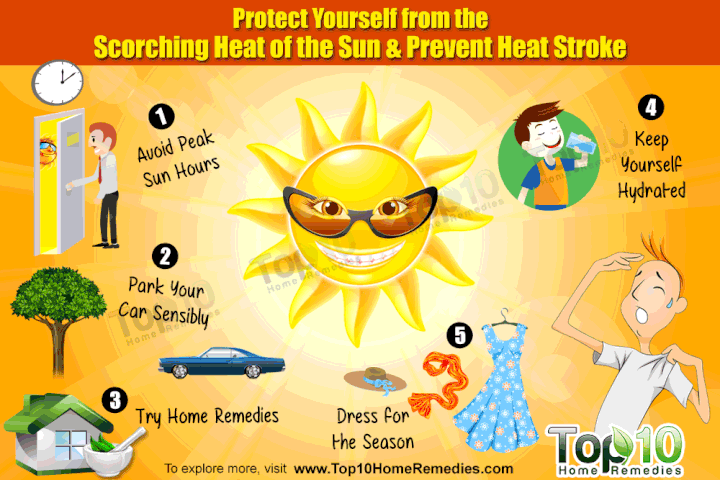How to Prevent Heat Stroke
How to Prevent Heatstroke
Heatstroke, also known as sunstroke, is a severe condition in which the body cannot cool itself through sweating and becomes overheated.
People are more likely to first have a heat cramp or heat exhaustion, which are less severe conditions. But when these problems are not treated and controlled in time, they lead to heatstroke.
Heatstroke is common among people living in hot, humid climates. It happens mainly due to a combination of dehydration and heavy exertion out in the sun.
Other factors that increase your risk are drinking alcohol, wearing excessive clothing, strenuous physical activity, sweat gland dysfunction and cardiovascular disease.
The main sign of heatstroke is a sudden increase in body temperature. Other symptoms include fatigue, headache and dizziness, decreased perspiration, muscle cramps or weakness, a rapid pulse rate, nausea and vomiting, flushed skin or redness, difficulty breathing, confusion and even loss of consciousness.
Anyone can experience this problem during the hot summer days, but some people are more susceptible to it. Elderly people aged 65 or older are more likely to get heatstroke. People traveling to hot, humid places for the first time are also at a higher risk.
Heatstroke can be fatal if not treated right away. Always seek professional help. Without proper treatment, it can cause severe damage to the brain or other vital organs.
However, there are many precautions and lifestyle changes that can help prevent heatstroke.
1. Avoid Peak Sun Hours
Stay out of the sun during the hottest part of the day, between 10 a.m. and 4 p.m. However, if it is very hot before or after these times, also avoid being out in the direct sun during those times.
If possible, schedule outdoor activities for the coolest times of the day, early morning or after sunset. If you need to go out when it is hot, make sure to apply sunscreen, wear a hat and stay in the shade whenever possible. Also, do not forget to carry a water bottle with you.
2. Get Acclimated to the Heat
Allow your body to acclimate to the heat to increase your ability to do strenuous work during the hot summer days. Acclimating means gradually getting your body used to the climate.
A sudden change in temperature can cause illness. So, after spending a long time in the sun, rest a bit before going into an air-conditioned building. This will prepare your body to handle the change in temperature.
Similarly, after sitting in an air-conditioned area, stay outside in the shade for some time before going out in the sun.
If you travel to hot climates for vacation or work, allow your body to get used to the heat before spending your day outside.
3. Exercise Carefully
Exercise is good for your overall health, but any strenuous activity in the daytime during the summer months can raise your body temperature, leading to heat exhaustion or heatstroke.
During the summer season, plan your exercise routine accordingly.
Avoid strenuous exercises during the day.
Avoid playing outdoor sports during the peak hours of the day.
Schedule your vigorous exercises for cooler times of the day.
If you go for a morning walk, do it before the outdoor temperature becomes too high.
Do aerobic exercises indoors and take regular breaks.
Consume enough fluids before, during and after exercising.
You can also opt for a gym, but make sure it is air-conditioned.
4. Park Your Car Sensibly
When parked in the sun, the temperature inside your car rises quickly. In addition, the oxygen level inside the car becomes dangerously low. This can lead to heatstroke and even death.
Park your car in a shady place.
Always lock your car after parking to prevent children from getting inside.
Do not sit in a parked car. Instead, stand outside your car under some shade.
Do not leave children or elderly people in a parked car, even if it is for a few minutes.
Do not leave animals, especially dogs, in a parked car.
Do not take a nap inside a parked car during the hot summer.
If you need to sit in the car on a hot day, make sure the air conditioning is on or at least open the windows all the way.
5. Try Home Remedies
To prevent heat exhaustion as well as heatstroke, you can even try some home remedies that can help regulate body temperature and keep your body cool.
Make a refreshing summer drink with the pulp of raw mangoes. Boil 4 to 5 raw mangoes with the skin. Allow them to cool, then extract the pulp. Put 2 tablespoons of the pulp in a glass of cold water. Add 1 tablespoon of sugar and 1 teaspoon each of salt and roasted cumin seeds. Drink it 2 or 3 times a day to keep your body cool.
Onions are good to guard against heat stroke. You can consume onion in any form, preferably in raw form, to prevent heat-related issues in the summer.
The juices of coriander or basil leaves are also very effective in keeping the body cool.
Drink a glass of green coconut water a few times daily.
6. Dress for the Season
During the summer, you need to choose your clothing wisely.
Light fabrics that allow your body to breathe can help keep you cool. Fabrics like cotton, linen, seersucker and chambray are the best options.
Switch to a lighter color palette. Lighter shades do not absorb heat and help keep your body cool. At the same time, wear lightweight, loose-fitting clothing. Avoid wearing excess clothing or tight-fitting clothes that do not allow your body to cool properly.
When going out, cover your head with a wide-brimmed hat, cap or scarf. Use sunglasses to protect your eyes. Also, carry an umbrella to shield yourself from the sun's rays.
7. Keep Yourself Hydrated
Drinking enough water throughout the day should be your utmost priority during the summer to prevent heatstroke.
When temperatures outside continue to rise, your body loses water faster and your body temperature can get high. By increasing your water intake, you can regulate your body temperature, prevent excessive sweating and avoid dehydration. All these factors will help prevent heatstroke.
Take regular beverage breaks and, if needed, set an alarm on your phone as a reminder.
Keep a water bottle handy so that you can take sips of water while you work or exercise.
Drink electrolyte-rich sports drinks to replenish lost electrolytes and water.
Drink water before and after exercising.
Apart from water, fluids like buttermilk and coconut water are also good options.
Avoid fluids containing either caffeine or alcohol as they can lead to dehydration.
Note: Those who have epilepsy; heart, kidney or liver disease; or are on fluid-restricted diets must consult a doctor before increasing liquid intake.
8. Eat Wisely
During the hot summer, you need to take extra care about your diet. A healthy and well-planned diet will keep your body healthy and prevent heat-related issues.
Include easily digestible foods in your diet. Yogurt is a good choice as it is cooling as well as easy to digest.
Include more fruits and vegetables with high water content and vitamin C in your diet.
Consume 2 to 3 glasses of buttermilk, made from yogurt, daily.
Avoid heavy meals. Instead, eat light meals 3 or 4 times a day.
Stay away from hot and spicy foods as well as fatty and fried foods.
Consume broths, soups and cereals with low-fat milk to keep your body hydrated.
9. Enjoy Cold-Water Baths or Showers
You can also take a cold-water bath or shower to reduce body heat whenever you feel very hot. Immerse your entire body in cold water for 10 to 15 minutes to regulate body temperature. You can also add a few drops of an essential oil of your choice to your bath.
Do not immediately jump in a cold-water bath or shower after coming in from outside. Rest for some time, sip cool water and then take a shower or bath. This prevents putting your body through a sudden, extreme temperature change.
If taking a bath or shower is not possible, spray cool water on yourself and sit in a cool place for 10 to 15 minutes.
10. Use Sunscreen Daily
Sunburn affects your body's ability to cool itself, so protect yourself from getting sunburned by using a sunscreen. In addition, too much exposure to the sun's harmful ultraviolet (UV) rays can damage your skin and cause other problems like sun spots and wrinkles.
Apply a good quality sunscreen on any exposed body parts before going outside. Use a sunscreen with a sun protection factor (SPF) of 30 or more, applying it generously all over exposed body parts like your hands, legs, neck, face and ears. Put the sunscreen on about 20 minutes before going out in the sun.
Even on cloudy, rainy and winter days, you must use a sunscreen.
Additional Tips
During the summertime, avoid drinking too much alcohol as it may affect your ability to judge temperature as well as lead to dehydration.
Do not over-exert your body and avoid activities under direct sun exposure.
Monitor the color of your urine to check for signs of dehydration. A dark yellow or amber colored urine points toward dehydration.
Keep windows that face the sun closed during the day and open them at night when the temperature has dropped.
Consider replacing metal blinds or dark curtains as they absorb heat.
If you suspect heatstroke, rest in a cool place and drink plenty of fluids. If possible, splash cool water on yourself or take a cold shower or bath to cool down your body.
If you notice someone having heatstroke, get immediate medical help without delay. While waiting for help to arrive, get the person out of the heat and into a cool area. Remove or loosen tight clothing and splash cool water on the person.
If taking blood pressure and heart medications, consult your doctor about how to prevent heatstroke.
If you have symptoms like high body temperature, dizziness, nausea and vomiting, seek immediate medical help.



+1.svg)
